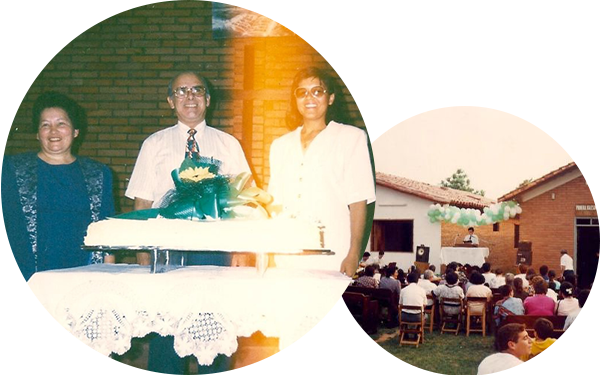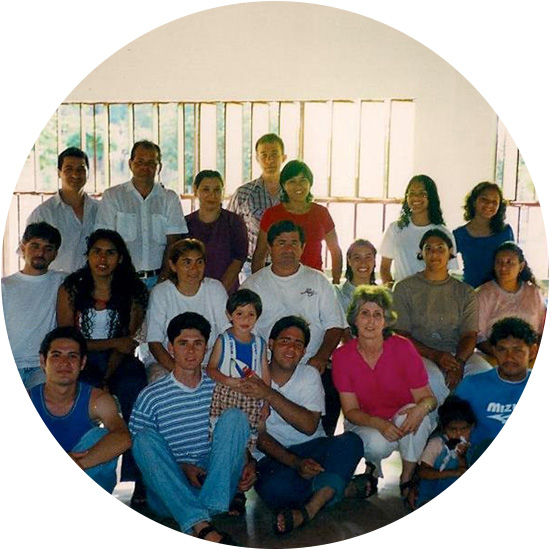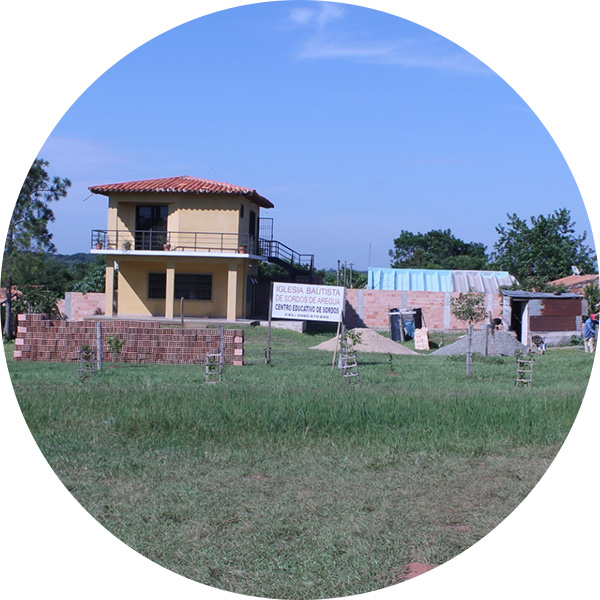
Observando el alcance que ha logrado el Ministerio de Iglesias de Sordos del Paraguay en comparación con sus inicios, se refleja el sueño de Dios depositado en ella, guiando cada paso de su vida hacia su propósito. Dios respalda este sueño, proveyendo todo lo necesario, lo que demuestra la fidelidad divina hasta el día de hoy.
A edad temprana Dios puso en su corazón el deseo de poder servirle enseñando la palabra. Asistía a la Iglesia Bautista “La Nueva Jerusalén”, quien animaba a los miembros a capacitarse en el programa de educación cristiana y expansión misionera que ofrecía el seminario teológico Bautista del Paraguay, donde inicia y culmina
sus estudios, al cabo de esos tres años Dios confirma su llamado de ser misionera motivo por el cual decide estudiar la carrera de teología recibiendo la licenciatura.
A los diecinueve años empezó a trabajar en la ciudad de Itauguá, en el anexo de la Iglesia Bautista “La Nueva Jerusalén.” Después de seis años, el anexo decidió constituirse como iglesia independiente, por lo que empezaron a orar y a buscar un pastor quien se hiciera cargo de la nueva iglesia.
Pastor Diosnel Silva Armoa, algunos diáconos, y el misionero Edilson Moraes le aconsejaron que quedara como pastora de la iglesia, puesto que el trabajo pastoral que se estaba desarrollando durante esos seis años lo venía realizando ella. Sin embargo, ser pastora, no estaba en sus planes, su deseo era dedicarse a la enseñanza teológica.
Finalmente, después de orar por un año, acepta la invitación de Dios de servirle en el campo pastoral. Es así que se organizó el culto de ordenación y dedicación de su vida al ministerio de la Palabra.
Este acto trajo muchas discrepancias entre los pastores bautistas de esa época, pues era la primera vez que una mujer iba a ser ordenada como pastora en la Iglesia Bautista.
"Yo tenía 26 años, no estaba en mis planes ser pastora, pero Dios tiene sus métodos y formas de hacer que hagamos cosas que algunas veces no estaban en nuestos planes."
— Mirta Barreto
Una semana previa a su ordenación, las reuniones de los pastores seguían hasta altas horas de la madrugada. Algunos apoyaban, otros estaban en contra. Ella, por su parte, se refugió en Dios y en su Palabra.
"Fue así que, durante mi tiempo devocional, una vez más, Dios confirmó su voluntad en mi vida al hablarme a través de Marcos 16:6 «Pero Jesús dijo: Dejadla; ¿por qué la molestáis? Buena obra ha hecho conmigo.» Esa palabra “dejadla” trajo quietud y confirmación en mi corazón, además de ser una palabra contundente para mi lamado."
— Mirta Barreto
A partir de allí, se abocó a servir a Dios con toda pasión y dedicación.Los años de ministerio pastoral en la Primera Iglesia Bautista de Itauguá fueron de mucha satisfacción. La iglesia creció con más de 120 jóvenes, quienes en la actualidad están sirviendo a Dios en diferentes partes del mundo, algunos de ellos como misioneros.

La Pra. Mirta inicia su llamado para servir a las personas sordas, ella va un retiro femenil donde una de las disertantes Donna Hastey comparte su llamado de ministrar a las personas sordas, ese testimonio impactó en la Pra. Mirta y sintió que debía hacer algo por las personas sordas,aun así, no tomó ninguna decisión al respecto por no dejarse llevar por lo emocional, además se hallaba pastoreando a tiempo completo la Iglesia Bautista de Itauguá.
Durante cinco años Donna buscó la dirección de Dios en oración, siendo la respuesta en tres ocasiones “habla con Mirta” hasta que un día Donna acudió al colegio donde enseñaba la Pra. Mirta preguntándole sin rodeos si le gustaría trabajar con las personas sordas y la misma le responde inmediatamente que “si” a la pregunta las tres veces, Donna durante esos cinco años oró a Dios diciéndole que si es su voluntad apartará una persona paraguaya y pidiendo como una confirmación sea un pastor, contactó con varios pastores, sin embargo, no se concretó con ninguno.
Donna y Mirta inician su capacitación por tres años en lengua de señas con la profesora sorda Gilda Salinas de Caceres conocida como Mamucha. Finalmente, el 7 de mayo del 2000, se logró llevar a cabo la primera reunión evangelista en lengua de señas paraguaya, marcando un hito significativo en la historia tanto en la comunidad sorda como en la cinematografía Paraguaya.
En mayo de 1999 ponen en marcha los estudios bíblicos con las personas sordas en la Iglesia Bautista, “La Nueva Jerusalén”,la primera traducción a Lengua de Señas Paraguaya surgió de la idea de organizar una reunión evangelista dirigida a personas sordas, se planeaba proyectar la película “Jesús” en la Lengua de Señas de Costa Rica,se contactó a una persona sorda para confirmar si la comprendía y resultó nula debido a que era muy distinta a la lengua de señas paraguaya, razón por la cual, se tomó la decisión de realizar la traducción a Lengua de Señas Paraguaya con los respectivos permisos que implicaba el doblaje de la película, la traducción duró seis meses y tres días de grabación en el estudio de Obedira.
Las primeras reuniones se dieron en el local del Hospital Bautista, luego en la Iglesia Bautista “La Nueva Jerusalén”estuvieron por siete años hasta que la convención Bautista les abrió su local para los cultos en lengua de señas.
En el 2008 reciben una ofrenda especial junto a los diezmos y ofrendas de los miembros de la iglesia de sordos de Asunción,con esto se compra cuatro terrenos en la ciudad de Areguá, en la cual funcionaba el centro de alfabetización y educativo donde se realizaron varios proyectos piloto enseñando la lengua de señas paraguaya y el español puesto que son idiomas diferentes, en este contexto se ofreció formación académica.
Transcurrieron los años dedicándose a la alfabetización, estudios bíblicos y los cultos con la comunidad sorda.
Desde el 2000 al 2013 surgieron cuatro iglesias Bautistas de sordos, dando origen al Ministerio de Iglesias de sordos, las cuales son “Iglesia Bautista de sordos” de Asunción, Areguá, Limpio, San Lorenzo.
Después de casi una década de iniciar el ministerio de las iglesias de sordos de Paraguay, la Pra. Mirta ve la necesidad de que las
personas sordas tuviesen la Biblia en su lengua natural.

En el año 2008 comenzaron a tener reuniones los días sábados con personas sordas e intérpretes de lengua de señas para orar, soñar y comenzar las primeras filmaciones caseras de traducción bíblica.
Arranca su investigación para saber como realizar el proyecto de traducción de la Biblia, contacta vía mail con personas y organizaciones alrededor del mundo, las cuales reenvían su mail a otras organizaciones de traducción bíblica, posterior a esto la Pra. Mirta contacto con el director de Letras Paraguay el Dr. Víctor Gómez y se formó una alianza entre el ministerio de Iglesias de sordos y Letras Paraguay y también se gestionó el apoyo de la agencia misionera The Seed Company, Wycliffe Associates.
En el año 2012 se continuó la traducción bíblica a la lengua de señas paraguayaa tiempo completo que funciono en el local de la convención Evangélica Bautista del Paraguay hasta el 2011 y a partir del 2012 se instalan en el local de la Iglesia Bautista de sordos en Areguádonde actualmente se sigue trabajando en la traducción bíblica y brindando cada domingo los cultos en LSPY.
En el año 2022 El centro de traducción lanza el Nuevo Testameno en lengua de señas paraguaya, obteniendo así el tercer puesto a nivel mundial y el primero en Latinoamérica.En el año 2023 se lanzó el Pentateuco totalmente en LSPY, siendo el segundo país a nivel mundial y el primero en Latinoamérica.
Hemos visto la fidelidad de Dios a lo largo de estos años, quien envió a diferentes personas que colaboraron en el proyecto de traducción, así como los recursos para el equipamiento y sostén de los miembros del equipo.
"Estamos seguros de que la traducción de la biblia a LSPY no solo es para las personas sordas, sino también para sus familias y amigos. Creemos firmemente en lo que la biblia dice en Isaías 55:11 “Así será mi palabra que sale de mi boca: no volverá a mi vacía, sino que hará lo que yo quiero, y será prosperada en aquello para que la envíen."
Historia